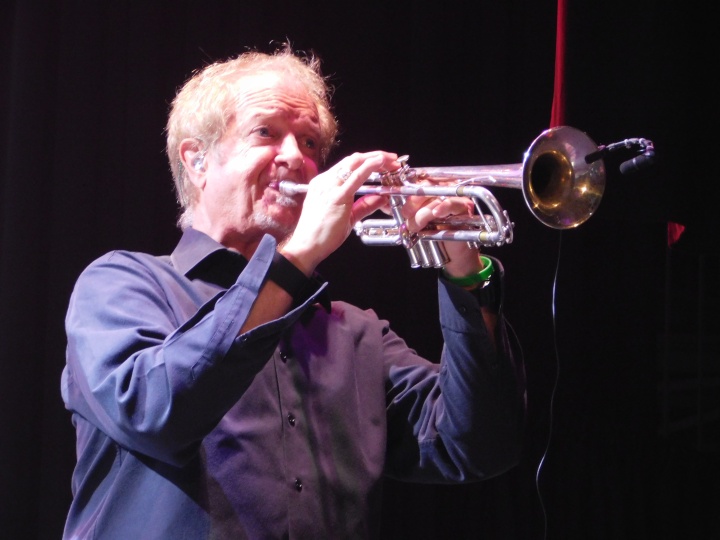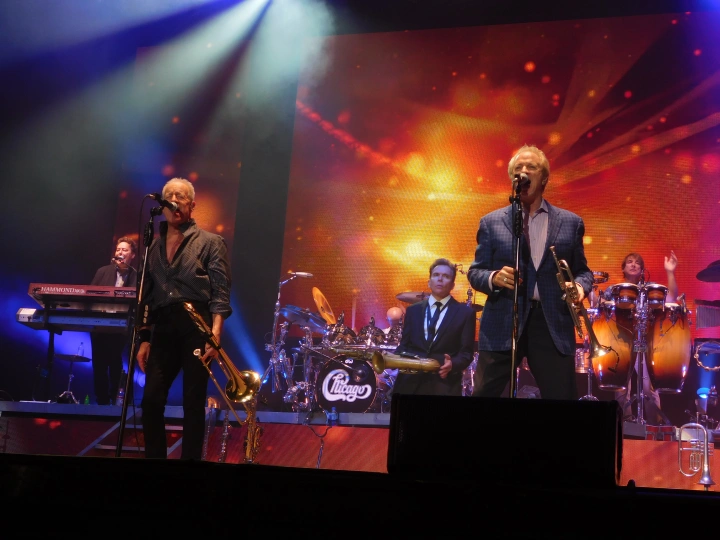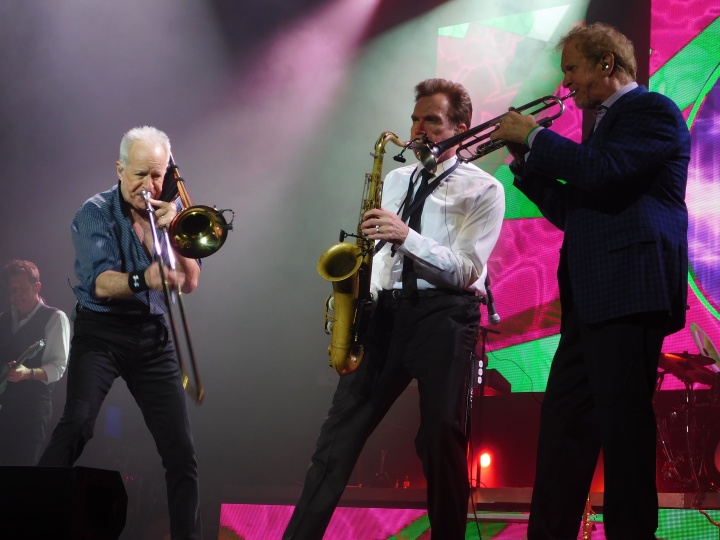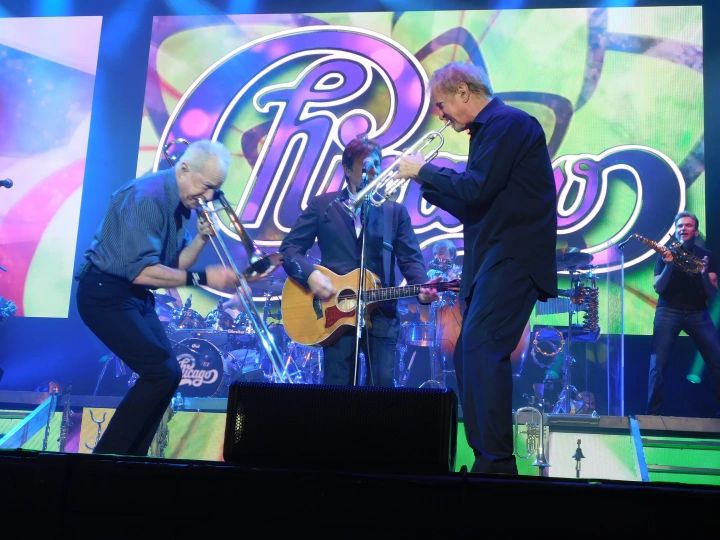Once Upon A Time, a jazzy, psychedelic, hippy rock band with horns stormed the college campuses of South Carolina, playing Furman University in 1970, Clemson University in 1971, and the Greenville Memorial Auditorium in 1974. Back in the early 70s, Chicago played to their peers, young people who may or may not have understood the musical education they received at those respective shows. Last weekend, Chicago triumphantly returned to South Carolina, and I was honored to attend two sold out shows, one at the Township Auditorium in Columbia and another at The Peace Center in Greenville. I heard a band celebrating their 50th anniversary, reinvigorated and playing with as much energy, if not more, as decades prior. Their setlist is full of huge hits, album tracks, and fan favorites, from their 1969 debut, Chicago Transit Authority, to the six times platinum Chicago 17. The utter charm of their songs, sounding just as urgent and relevant as ever was pure joy for myself and the entire audience. Most of all, it is beautifully apparent just how much fun Chicago is having at the twilight of their careers. Their survival is an unlikely story, against the odds, and a testament to their resilience and skill at navigating all the changes in the musical and social landscape over the decades.
Before the Greenville show, I was honored to sit down for a chat with Lee Loughnane. His insights on Chicago’s evolution as a band provide a life lesson on perseverance and flexibility. We talked about some classic records, his development as a trumpet player, Chicago’s future, and more.

Stephanie Carta: Jeff Coffey sounded fantastic last night. Congrats on your new addition to the band.
Lee Loughnane: From the first time we got together, we were happy with what it sounded like from that first day. We just played a couple James Brown tunes, and I’m A Man. Everybody took solos. It’s important that people are able to play The Ballet because there’s so many different time changes, musical transitions, and feel. It goes from rock and roll to classical. You have to be a fairly well-rounded musician to just play the song. It’s important to play that one, but we haven’t had that many auditions in fifty years. People just sort of join the band, and they know the material. With Jeff it was a little different because we had to replace him fairly quickly because we had no idea how long Jason (Scheff) was going to be gone and when he said it was four months. We can’t take four months off. We’ve got to keep going. We’ve got seventy shows booked. We can’t stop playing and not show up. So Jeff came in, and we rehearsed for one or two days, and we were playing. If he had two rehearsals I’d be surprised, so he was very well prepared by the time we hit the downbeat on our first show.
SC: People call the 70s the classic era, but I think you’re living in it now. This is the classic era.
LL: It’s classic because we’re able to still be living.
SC: You embrace your whole history in your shows.
LL: Yeah. It covers the first album, from Introduction all the way up until today.
SC: I want to congratulate you, first of all, for keeping the band in the spotlight for fifty years.
LL: We’ve had ups and downs, and it’s amazing to me that we’re still able to do it, especially at this level. We’re selling out shows every night now as a result of the notoriety of the Rock and Roll Hall of Fame and then the documentary (Now More Than Ever: The History of Chicago) being on CNN. It’s been fabulous for us. I just did another interview, a radio interview, and he asked if someone would have come up to you and said, ‘do you think that the band will be together for fifty years,’ we would have just laughed, just like you’re doing right now. There’s no way that you could imagine this would go on this long. Figure, by the time you’re thirty, it’s done. Usually, five years.
SC: Or you’re just an ‘oldies act.’
LL: Yeah. We’re an oldies act, but it’s like current. It’s sort of a strange way of putting it, but it feels current to me.
SC: It feels current to the audience too.
LL: That’s good.

SC: You once said Chicago VII was one of your favorite records.
LL: It’s because there were more writers that came. I wrote my first song. It was on Chicago VII, Call On Me. By the time I came up with an original song the band was very well established with six albums and major success. So I sort of came in with, ‘you wanna hear my song,’ very timid. I didn’t know if they wanted to do it. I didn’t think it was good enough. My personality, ‘I’m not good enough,’ and you know, ‘I’m just trying.’
SC: #1 on the Adult Contemporary charts in 1974.
LL: It made it, yeah. It made it to #6 on the Hot 100 or something.
SC: Did you enjoy playing the jazz on that record?
LL: Yeah, that was fun. We initially intended that record to be all jazz, and then realized that we’re going to need some other music besides that, so it kept developing.
SC: How about Chicago III? What do you remember about Chicago III, and how do you think it’s aged over the years?
LL: We still do a couple of songs off of it, but I don’t think it was accepted as much as I and II. I think maybe now it’s more accepted than it was back then, but I loved doing the Travel Suite. That was a lot of fun. I got to play guitar on the Travel Suite and sing a little bit because there were no horns on that one. Happy ‘Cause I’m Going Home, that was fun. Walt had a nice flute solo on that.
SC: He did. One part of Elegy that blows me away is Once Upon A Time.
LL: It turned very mellow, and then it got very powerful at the end.
SC: Almost like a protest song.
LL: Which is sort of where we were at the time, young kids thinking we can change the world. But, a revolution? I think it was all in our minds as it turned out. The revolution is something that you can’t do anything really forcefully. We were still at the point where we were trying to educate people musically, and what we learned was people don’t want to be educated musically. They just want to have fun. That’s it. So, I think once we settled into that mode and realized that from the seventh album we wanted to just play new stuff and just the jazz tunes that we were doing. We tried that for one tour and realized at that point that it was going to be over if we didn’t play some songs that put us on the map. That’s when we started putting shows together that made sense as far as trying to make the audience as happy as us. Before that, I think we were mistakenly just trying to please ourselves. So, once that changed we started performing better, I think.

SC: How did your classical training help you?
LL: It just helped me be a better trumpet player, and I’m learning more now than I ever did back then. I think because of the volume that we always have to play at in this band, you end up over-blowing almost all the time, and I’m trying to get enough air and learn the art of playing the trumpet well enough so I will last until the end of the show the way I want to be lasting. By the end of the show I’m forcing myself to keep everything going, and I don’t think anyone else notices but me. I think that’s the biggest thing, right?
SC: You had to learn how to pace yourself and keep your tone.
LL: Exactly. That’s what you do.
SC: Ballet For A Girl In Buchannon, you play that every night.
LL: For some reason it works in the beginning of the show. We can open with it. We can play it in the middle, or we can play it at the end. We’ve put it in every phase of our show through the years, and it always works.
SC: A twelve minute suite, and people pay attention.
LL: Yeah, it’s bizarre! I just saw from the Songwriters Hall of Fame that he (Jimmy Pankow) wrote that when he was twenty-two. That’s a pretty young age to have something like that come through you.
SC: The three of you, Walt (Parazaider), Jimmy, and yourself, when you were just getting together, “blowing with one lung,” was that natural or did it take a lot of practice to play in unison?
LL: Just repetition, over and over, and you start doing things. It amazed us that we were taking breaths together, phrasing the way that we did, because it’s different than a big band. The way we play is different than the way big band stylists put their sections together. The lead trumpet player is usually the leader of the section, and then there’s a lead trombone player, likewise a saxophone player. We were the whole section, the three of us. Then when we overdubbed, we already knew what we played the first time, so we tried to match that playing different notes and we’d just fill out the chord, doubled-tracked and sometimes triple on the ballads. We would have one (track) in the center and one on either side. Sometimes it would be all three horns here, all three horns in the center, all three horns on the sides. Sometimes there’d be trumpet, trombone, then we’d switch and there’d be horns all over the place.
SC: A wall of horns. That’s your sound.
LL: A wall of horns! Right!
SC: What trumpet players inspired you the most?
LL: Clifford Brown, Doc Severinsen – incredible! I’m having trouble thinking of all the names, there’s so many guys. Clark Terry was incredible.
SC: Have you ever listened to Lee Morgan?
LL: Lee Morgan’s great. Yes, Sidewinder. Oh yeah, Lee Morgan’s one of the greats too.
SC: They just made a movie about him.
LL: Really! Is it out now?
SC: It’s out now, playing the festivals and theaters.
LL: What’s it called?
SC: I Called Him Morgan.

SC: Are there any plans to record again?
LL: If somebody comes up with a song and we want to record out on the road, we have the equipment to do it with. I think when we did 36, it sort of burned people out. I don’t think Robert (Lamm) was all that happy with recording on the road, and I don’t know if he wants to repeat the process. Although, we’ve learned how to do it, and I think we can make it better. I think we can improve on what we did before, and I’ve already improved on the equipment. With the engineer, Tim Jessup, we’ve built up what we have out here. It’s still the same size, but the guts are better, more powerful.
SC: Are you writing songs now?
LL: I’m in the process of writing a few songs, yeah.
SC: I really like America.
LL: Oh great, thank you.
SC: And you sent that to every member of Congress?
LL: We did! It didn’t become a hit though (laughs). It was a miss.
SC: It’s a fan favorite.
LL: Is it? Good! That’s great. We did it in concert for a while.
SC: Going back to the beginning of recording and how structured CBS Studios was with all their rules. How did that feel?
LL: The unions in New York are crazy no matter where you go, no matter what phase of life you’re talking about, whether it’s building a bridge or recording an album. The union is separate from everyone else. They have their rules, and you’ve got to follow the rules or you don’t play at all. So, we couldn’t touch the controls. We couldn’t touch the machine or the tape. It was all their purview. Things have changed quite a bit since then.
SC: How did it feel to go from that type of structure to the freedom that you know today?
LL: I don’t think it bothered us, per se, as much. All we did was play, and write, and sing, and do our best to make good music. The technical aspects were never really what we did. I listened, and I watched, and I looked at it. I kept wanting to learn more and more, and that’s why I’m able to do what I’m doing today. When the computers came out, I got into that. The computers get old so fast. You have to really keep going and moving forward. While we’re talking right now, the computer world is changing. That’s how fast it’s happening. And the internet is changing all the time as well. Record companies are trying to remain in business. They’re all trying to figure out how to remain powerful when the power is being taken away from them because of the freedom of anybody being able to record a record in their room and release it. So, they’re trying to keep that strong base of, ‘well, without us you don’t have a hit record’ stuff. That doesn’t always cover it anymore.
SC: How does that affect how you get your music out to the fans?
LL: We have to learn that too: what is the best way to do it. We’re learning along with everybody else. The only thing we know how to do is make music. Getting it out there to people is a tough thing.
SC: You’ve worked with whatever is thrown at you.
LL: Yeah. We’re lucky to be doing this. I’m having fun, and I think that’s the important thing is to always enjoy yourself.
SC: It’s heartwarming to see, after 50 years, how much fun you are having.
LL: Yeah. It’s great.

SC: What’s the future for Chicago?
LL: Well, we’re definitely finishing off this year. I don’t know how many years we have, realistically, left. Father Time is taking its toll. It’s harder to travel, all that stuff all the time. Travel’s never been easy, but once we get on stage, time goes away again. Travel time goes away. If you’re tired, it doesn’t matter. You just work. As soon as the downbeat comes, we’re kids. I’m very happy about Jimmy and Robert getting into the Songwriters’ Hall of Fame. They’re going to be in there with the best songwriters in the history of music.
SC: You were all very gracious to accept induction into the Rock Hall.
LL: Oh, that was great. It sort of showed the guys that aren’t with the band anymore, the reason why. It put it out there for everyone to see. We still enjoy what we’re doing, and it would seem like they would do it and want to embrace at least some of the childhood that we had together. But they didn’t want it. Even Danny (Seraphine) showed that he was a little bit different.
SC: You should just be proud of yourself.
LL: When I go home, I get to raise my son. He’s going to be fourteen in April. By the time I get home I will have recorded four episodes of Walking Dead and three episodes of Lethal Weapon. He’s looking forward to watching those with Dad. They grow up in the fast line now, faster than the fast lane that we grew up in. I know my parents didn’t want me to grow up that fast.
SC: I found your second album in my parent’s basement. That’s what started my love for your music.
LL: What year was that?
SC: 1985.
LL: Oh my God, so we were already making the fifteenth or sixteenth album. Sixteen. We were calling it fifteen, and then CBS, that we had just left, released the Greatest Hits album which became Chicago 15. So, we had to change our number to 16, the first album with David Foster, that David Foster produced, with Hard To Say I’m Sorry.
SC: I liked that Foster gave a good interview for the movie (Now More Than Ever: The History of Chicago).
LL: Yeah! He definitely showed his personality as well.
SC: You have this mythology that Foster ruined Chicago, wherever that comes from.
LL: Same place that Yoko ruined The Beatles, just people’s heads. That’s what they decided, and that’s what everybody thinks. People think we’re a ballad band, still to this day. You come hear the show, and you know that we’re not. We play all sorts of music and all sorts of styles, and the ballads, they still work every night too. There’s some power ballads, and even David realizes that he took it a little too far with how over-produced it is. But, regardless, it still works.
SC: I have the Friday Music reissue of 17, and that sounds fantastic.
LL: Good. Joe Reagoso, he’s a big fan as well. He’s a stickler for making it sound as good or better than the original.
SC: I hope you get to remix the first record too.
LL: Me too! Our engineer, Tim Jessup, he’s got his hat in the ring with Rhino. Hopefully, he will do it rather than the guy from Britain. (The Wilson Remix of II) was in a computer, what they call “in the box.” The equipment that we have will take it as far out of the box as we can possibly get it and still be in a computer, without going into a studio and actually re-recording it. I don’t even know what the technique would be, but you’ve got to take the tracks and do a different format, a different machine. I don’t know the technical aspects of it, but we can make it sound better, that’s for sure.
SC: The albums you recorded at Caribou, the quad mixes, I thought were fantastic on the Quadio box.
LL: The quad mixes, going back to putting everything into different speakers, it’s just different than the album was envisioned in the first place, mechanically and sonically. You’re quite the aficionado.
LL: This has been fun.
SC: Thank you.
All of human history is a story of continuity and change. There are common strains throughout the times, as well as breaks with the past. Chicago is no different. The songs endure, endlessly inspiring. Everyone who remembers Chicago from the 1970s is treated to three familiar faces on stage, and I treasured the connection to the original band. At the same time, the entire current lineup of Chicago makes their catalog sound brand new, everyone playing with a fresh vigor to musical perfection. Chicago, not only endures for their 50th anniversary, but also gracefully takes their place in history as a great little rock band with horns.
A big thanks to Lee Loughnane for the conversation and showing the music world how to come out even stronger than where you started.
Great interview Stephanie.
LikeLiked by 1 person
Lee is the reason I continue to play, always looks like he’s still having fun, Make(s) Me Smile! Great interview,thank you.
LikeLiked by 1 person
Really enjoyed reading your interview, I hate I missed seeing Chicago this time around.
LikeLiked by 1 person
Love Chicago , I just missed them when I arrived in Melbourne 1980 …still waiting for a tour of Oz ….
LikeLiked by 1 person
I enjoy your writing, Ms. Carta. The music of Chicago changed my life, leading me to a college in Ohio that had a rock band with horns, which I joined and where my wife and I became a couple. After living in Chicago (the city) for two decades, we now live 45 minutes from Caribou, where we’ve gone to ride horses. Thank you for your journalism.
LikeLiked by 1 person